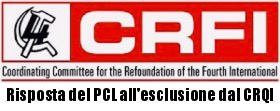Internazionale
The Iran-Israel confrontation
The crisis of the world imperialistic order
14 Aprile 2024
Last night's Iranian military action against Israel is part of the worsening international crisis. It's an effect and a contributing cause at the same time. The dynamics of current events are not yet defined. Several variables are in play. But it is possible to frame some initial essential elements.
The Iranian military action is a response to the Zionist state's murderous attack on the Iranian consulate in Damascus. The response itself is legitimate. Israel bombed the diplomatic headquarters of a foreign state, within the borders of another state, in a thuggish military action. It was so thuggish that Israel itself could not publicly show off it. To deny Iran the right to respond to Israel's attack would mean to assert the Israeli right to impunity. This would be inconceivable, all the more so in the context of the war of annihilation waged by the Zionist state against the Palestinian people of Gaza, with the complicity of allied imperialisms.
To support this right of reply, in opposition to all ideological pacifism, certainly does not mean for our part to politically support the archreactionary regime of the Islamic Republic of Iran, nor does it mean to demand a war between the Iranian state and the Zionist state. The Islamic regime of Iran is and remains a despotic regime, responsible for the daily oppression of workers, youth, women, and the Kurdish population. A terrible and bloody oppression. But the only ones who have the right to overthrow this regime are the working class and the oppressed Iranian masses, for to their own liberation aims, not imperialism and Zionism by military means, for their own hegemonic interests.
What is important now is to understand the logic of the different actors in this confrontation, and the tangle of contradictions that runs through it. The Islamic Republic had to respond to the Israeli attack on its consulate in Syria to avoid appearing a paper tiger in the eyes of its regional allies and partners. At the same time, it has no intention of embarking on an unfolded war that could jeopardise its own hold and survival. Hence a restrained military reaction, mainly demonstrative, announced well in advance, indirectly agreed in some respects, in its moderation, with the diplomacy of the adversary imperialisms themselves, including US diplomacy.
The real question mark now is the Israeli reaction. In the past seven months, the Netanyahu government, and specifically the prime minister, have used the Gaza war as a tool of their own political survival. In doing this, they have of course used the unwavering support of allied imperialisms, starting with US imperialism. They also forced and overruled their 'advice' in the management of the war operations. At the same time, they have tried to polarise the confrontation on a regional scale against Iran in order to force the allied imperialisms to side with them, and restrict their room for manoeuvre. The attack on the Iranian consulate itself, pending an inevitable response, was part of this reckless game. However, beyond a certain point, Netanyahu's game becomes too risky.
All the imperialist powers, starting with the US, are asking the Israeli government not to respond to the Iranian attack with its own military retaliation, but to wait for a joint international response of a diplomatic nature. In practice, Biden asks Netanyahu not to open the war against Iran, and to escape an uncontrollable spiral. The same prompt American and British military assistance to Israel in confronting Iranian drones, even with the use of aircraft carriers and fighter jets, is aimed at warn Netanyahu: "Precisely because we have defended you together, we now ask you to move together". In other words: we offer you the diplomatic condemnation of Iran in exchange for your renounciation of a war against Iran.
This complex exchange summons the underlying contradictions of US imperialism and the crisis of its hegemony on a global scale. All US policy since 2008 has been strategically aimed at countering Chinese imperialism, and indirectly its Russian ally. The 2020 Abraham Accords between Israel, the United Arab Emirates and Bahrain served the US to try to 'pacify' the region (on the skin of the Palestinians) within a new balance of powers and diplomatic architecture, which would allow them to turn towards the Pacific, concentrating their forces on that side. But first the Ukraine war, then the Gaza war, called US imperialism back to its duties as a dominant imperialist power on unforeseen theaters of war. A dominant role, however, far more fragile than in the past. All the more so in the Middle East.
Russian imperialism is back in the game in the Middle East via the Syrian war with its decisive support for Assad. Chinese imperialism has officiated in the détente between Saudi Arabia and Iran, breaking the latter's isolation and entering the regional game. Turkey plays the role of an autonomous regional power according to its own neo-Ottoman project, supporting Hamas and denying the US any possible use of its airspace to wage war against Iran. Israel's conduct in Gaza, repeatedly indifferent to American concerns, has tested US and deepened its hegemony crisis in the region, throwing the Abraham's web to the wind, and encouraging the free game of all rival imperialisms and powers.
In this context, today US imperialism does not desire an open war against Iran. It needs to regain the grip of a political initiative in the Middle East, not an out-of-control war that could overflow into a world conflict. At the same time, international events show that not everything is unfolding according to the calculations and will of the US, as so many ludicrous explanations and theories would like us to believe. Hence the unknowns and objective dangers.
No doubt the entire turn of world events shows the crisis of the imperialist order at a global scale.
USA hegemony is openly in crisis, and at the same time no alternative hegemony is emerging. World imperialism lacks a centre of gravity, within a competition between old and new imperialist powers for the division of the world. This leads to the multiplication of actors, on a global and regional scale, with unpredictable effects and results.
No imperialist power today wants the third world war. But the arms race of all imperialist powers, old and new, is in fact, in the historical perspective, a race towards war and its preparation. Only a socialist revolution, which seals the reasons of the working class with the reasons of all oppressed peoples, can avert this tragic prospect for humanity.










